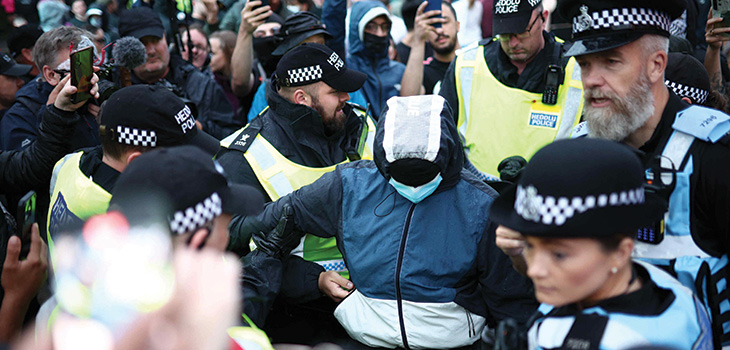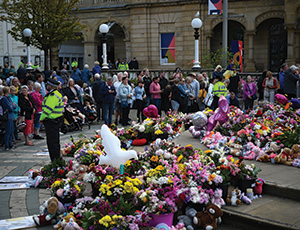*/

The summer of 2024 will, for some, provide recollections of distant summer holidays, days out at the beach, barbecues, weddings and warm summer nights. However, for many, the stark violence that broke out in local communities across the UK left not only a distant memory, but a long-lasting effect.
The first incident of violent disorder was on 30 July 2024 in Southport, Merseyside, lasting several hours and involving approximately 1,000 individuals. Missiles and fireworks were thrown, homes were damaged, police officers were injured, a mosque was targeted and racist chanting was heard among the crowd.
In the bleak days that followed, further mass disorder broke out across the UK fuelled by misinformation shared online. Travel warnings were issued by several countries, including Sweden and Australia, advising nationals not to travel to the UK because of the escalation of violence.
By the end of 3 August 2024, there had been three major incidents of mass violence in Merseyside. The threat of more disorder was still alive.
Time was of the essence and the need to protect the public from ongoing violence was at the forefront of everyone’s minds.
Overnight, a dedicated team was set up in Mersey-Cheshire Crown Prosecution Service to ensure that requests from the police to charge suspects could be swiftly handled and prosecutions taken forward for those who had broken the law.
A decision was made at Liverpool Crown Court to expedite the sentencing hearings of those responsible and broadcast sentencing remarks. On 8 August 2024, with immediate effect, the Senior Presiding Judge issued a direction that cases arising out of a major public disorder should be committed to the Crown Court for sentence at the first available date and time.
I was one of two counsel who prosecuted these cases at Liverpool Crown Court, where the first case in the UK was televised and sentenced by the Honorary Recorder of Liverpool Judge Menary KC.
Cases involving those who participated in the violent disorders were prosecuted in addition to my existing court commitments. Other cases were still listed as normal at Liverpool Crown Court.
Multiple defendants involved in the violent disorder cases were sentenced together. The sentence hearings would often start in the morning and conclude later in the afternoon. The public gallery was always full of local and national media, the atmosphere in the courtroom palpable. The solemnity felt by all those present was clear. Every time footage was played of another incident or element of the disorder, everyone watched in disbelief. How could this be our community?
As soon as the sentence hearings were finished, I would prepare the next day’s cases.
My evenings were spent collating and examining evidence and drafting thorough sentencing notes and submissions. They had to be drafted as quickly as possible to allow the sentencing judge sufficient time to read and consider overnight.
As prosecuting counsel, part of my role involved making sure that even while justice was being delivered swiftly, the court was still presented with a full picture of the defendant’s criminality.
I recommended that the police use specialist software on CCTV footage, which circles an individual and follows them throughout, making them more easily identifiable in the vastness of the disorder when presented to the court.
I also advised the police to create compilation footage which helped to build a comprehensive picture of each incident in Merseyside, so that the judge could take into account the full scale of the disorder and the impact of individual criminal actions on the disorder as a whole.
The footage became instrumental when faced with arguments that the actions of an individual defendant should be treated separately from the disorder, or that the disorder on an adjacent street or further down the same road was disconnected.
A member of the police attended every sentencing hearing, which gave the opportunity to work collaboratively and deliver feedback, direction and guidance for future prosecutions.
Some crimes included elements of racial motivation and this was another aspect of the cases that required sensitive attention. It was well documented that racist chanting accompanied the disorder that took place in Southport, coupled with the targeting of a community mosque.
In other crimes arising out of the other disorder, clear dialogue with the police to obtain statements and victim impact statements setting out the impact of the crimes, coupled with the compilation footage, sometimes resulted in racial hostility being demonstrated. This gave the court the power to uplift the sentences to reflect the racial aggravation.
The swift and strong collaborative action taken by the police, courts and CPS finally brought an end to the disorder in Merseyside.


The summer of 2024 will, for some, provide recollections of distant summer holidays, days out at the beach, barbecues, weddings and warm summer nights. However, for many, the stark violence that broke out in local communities across the UK left not only a distant memory, but a long-lasting effect.
The first incident of violent disorder was on 30 July 2024 in Southport, Merseyside, lasting several hours and involving approximately 1,000 individuals. Missiles and fireworks were thrown, homes were damaged, police officers were injured, a mosque was targeted and racist chanting was heard among the crowd.
In the bleak days that followed, further mass disorder broke out across the UK fuelled by misinformation shared online. Travel warnings were issued by several countries, including Sweden and Australia, advising nationals not to travel to the UK because of the escalation of violence.
By the end of 3 August 2024, there had been three major incidents of mass violence in Merseyside. The threat of more disorder was still alive.
Time was of the essence and the need to protect the public from ongoing violence was at the forefront of everyone’s minds.
Overnight, a dedicated team was set up in Mersey-Cheshire Crown Prosecution Service to ensure that requests from the police to charge suspects could be swiftly handled and prosecutions taken forward for those who had broken the law.
A decision was made at Liverpool Crown Court to expedite the sentencing hearings of those responsible and broadcast sentencing remarks. On 8 August 2024, with immediate effect, the Senior Presiding Judge issued a direction that cases arising out of a major public disorder should be committed to the Crown Court for sentence at the first available date and time.
I was one of two counsel who prosecuted these cases at Liverpool Crown Court, where the first case in the UK was televised and sentenced by the Honorary Recorder of Liverpool Judge Menary KC.
Cases involving those who participated in the violent disorders were prosecuted in addition to my existing court commitments. Other cases were still listed as normal at Liverpool Crown Court.
Multiple defendants involved in the violent disorder cases were sentenced together. The sentence hearings would often start in the morning and conclude later in the afternoon. The public gallery was always full of local and national media, the atmosphere in the courtroom palpable. The solemnity felt by all those present was clear. Every time footage was played of another incident or element of the disorder, everyone watched in disbelief. How could this be our community?
As soon as the sentence hearings were finished, I would prepare the next day’s cases.
My evenings were spent collating and examining evidence and drafting thorough sentencing notes and submissions. They had to be drafted as quickly as possible to allow the sentencing judge sufficient time to read and consider overnight.
As prosecuting counsel, part of my role involved making sure that even while justice was being delivered swiftly, the court was still presented with a full picture of the defendant’s criminality.
I recommended that the police use specialist software on CCTV footage, which circles an individual and follows them throughout, making them more easily identifiable in the vastness of the disorder when presented to the court.
I also advised the police to create compilation footage which helped to build a comprehensive picture of each incident in Merseyside, so that the judge could take into account the full scale of the disorder and the impact of individual criminal actions on the disorder as a whole.
The footage became instrumental when faced with arguments that the actions of an individual defendant should be treated separately from the disorder, or that the disorder on an adjacent street or further down the same road was disconnected.
A member of the police attended every sentencing hearing, which gave the opportunity to work collaboratively and deliver feedback, direction and guidance for future prosecutions.
Some crimes included elements of racial motivation and this was another aspect of the cases that required sensitive attention. It was well documented that racist chanting accompanied the disorder that took place in Southport, coupled with the targeting of a community mosque.
In other crimes arising out of the other disorder, clear dialogue with the police to obtain statements and victim impact statements setting out the impact of the crimes, coupled with the compilation footage, sometimes resulted in racial hostility being demonstrated. This gave the court the power to uplift the sentences to reflect the racial aggravation.
The swift and strong collaborative action taken by the police, courts and CPS finally brought an end to the disorder in Merseyside.



The Bar Council is ready to support a turn to the efficiencies that will make a difference
By Louise Crush of Westgate Wealth Management
Marie Law, Director of Toxicology at AlphaBiolabs, examines the latest ONS data on drug misuse and its implications for toxicology testing in family law cases
An interview with Rob Wagg, CEO of New Park Court Chambers
What meaningful steps can you take in 2026 to advance your legal career? asks Thomas Cowan of St Pauls Chambers
Marie Law, Director of Toxicology at AlphaBiolabs, explains why drugs may appear in test results, despite the donor denying use of them
Ever wondered what a pupillage is like at the CPS? This Q and A provides an insight into the training, experience and next steps
The appointments of 96 new King’s Counsel (also known as silk) are announced today
Ready for the new way to do tax returns? David Southern KC continues his series explaining the impact on barristers. In part 2, a worked example shows the specific practicalities of adapting to the new system
Resolution of the criminal justice crisis does not lie in reheating old ideas that have been roundly rejected before, say Ed Vickers KC, Faras Baloch and Katie Bacon
With pupillage application season under way, Laura Wright reflects on her route to ‘tech barrister’ and offers advice for those aiming at a career at the Bar